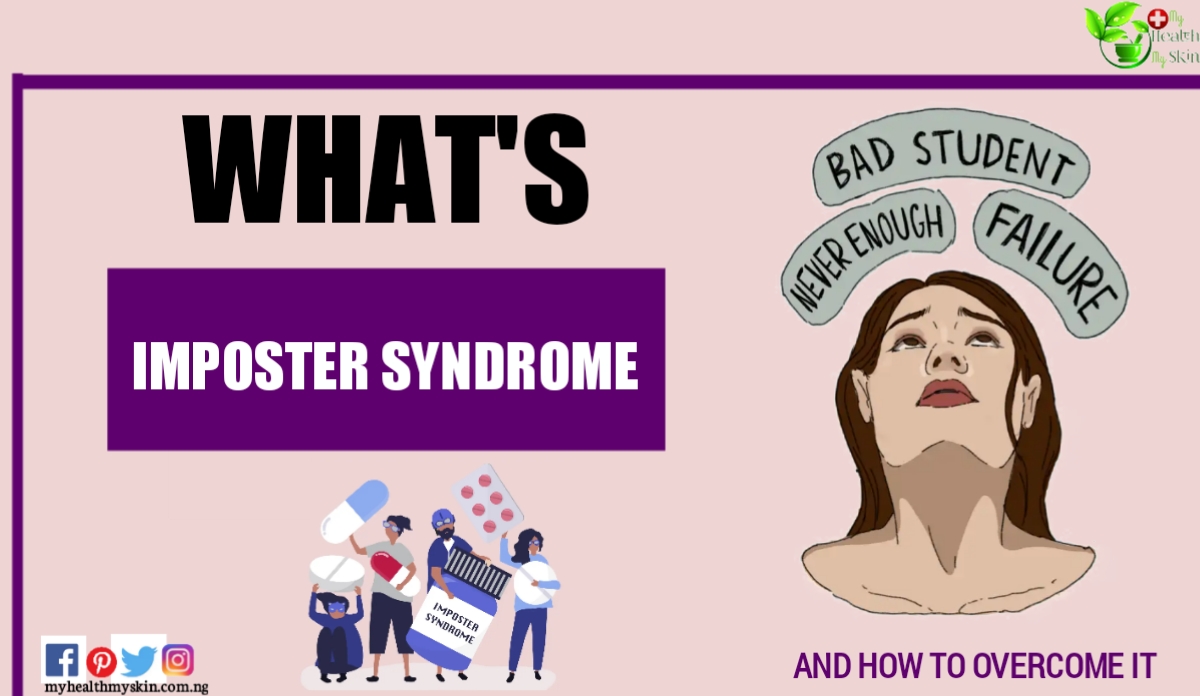In this article we are going to talk about the impostor syndrome.
All people tend to have bad stages, moments in life when they do not find themselves.
These situations, many times, can be related to one’s worth and achievements. To see more articles on physical and mental health click here.
If you want to know if you may be suffering, start by asking yourself these questions:
Have you ever had the feeling that the achievements you were achieving were due to a stroke of luck?
That your new position, your salary increase, the congratulations of your superiors was it due to a series of coincidences that you did not know very well where they came from?
Maybe you feel that you do not deserve the things you get or that you are not worth what others believe.
Maybe sometimes you feel like an impostor, and you think that if others really knew you they would not hold you in such high esteem.
if it is well, keep reading.

What’s Imposter Syndrome?
The impostor syndrome, also known as fraud syndrome, is a psychological problem that occurs when the person is unable to recognize their own achievements and their worth, according to De Salud Psicólogos.
It occurs mainly in more successful people who have many achievements and triumphs, since the impostor syndrome leads them to not recognize them, so success is often minimized and underestimated.
The truth is that people with imposter syndrome, despite their successes, are convinced that they do not deserve the achievements they have made.
Some researchers link imposter syndrome to perfectionism, especially in women.
In addition, it tends to show itself in the academic, work, social, interpersonal and family spheres.
Imposter syndrome is related to low self-esteem. People who suffer from it do not have a good concept of themselves and therefore never consider themselves capable.
The causes are multifactorial, as in almost all cases.
These people may come from environments where they have not been valued enough and, therefore, the way they have learned to relate to themselves is from this little consideration.
On the other hand, they can also come from highly demanding homes, in which “it is never enough”, which is why a high fear of failure develops that disguises itself as “I am not smart enough” or “It is not that not I want to get it, I just can’t”.
In addition to work and academics, the impostor syndrome can appear in practically all facets of the person.
In the social area, in the family, in sports, as a couple.
All achievements are rejected because they are not aligned with the concept of oneself.
What Are The Symptoms And Causes Of Imposter Syndrome?
Imposter syndrome was identified in 1978 by two psychologists, Pauline Clance and Suzanne Imes.
The truth is that Clance experienced it while preparing for some important exams.
Later, when she was already a teacher, she saw it again reflected in her students: people with excellent grades felt more inferior to the rest, since they thought that their successes were due to chance.
From Health Psychologists, they confirmed that the causes of the impostor syndrome are due to low self-esteem, an academic record of little relevance or criticism, the lack of self-confidence, the loss of confidence or the insecurity caused by some experiences.
On the other hand, the main symptoms of impostor syndrome, according to the same experts, are the following:
- The person does not believe his own achievements or believes that they are due to the luck or help of others.
- The person does not believe in their abilities.
- The person is afraid of being discovered as a fraud.
- There are expectations of failure in normal situations.
- A demotivation associated with a lack of self-confidence is created.
- Situations of anxiety, sadness, depression or hopelessness occur.
- The person lives a permanent dissatisfaction.
In this way, those who suffer from impostor syndrome are afraid of being discovered as such, suffer feelings of guilt, believe that they have deceived others, do not enjoy their achievements and feel that they can do things better, that they have not made an effort enough.
Is Imposter Syndrome Real And Is It Possible To Identify?
According to experts, to detect impostor syndrome, you have to look at the symptoms, that is, analyze if the person suffers from them.
Thus, a person who does not enjoy his successes, who has a great lack of self-confidence or who is very pessimistic and puts himself in the worst circumstances, can suffer from the fraud syndrome.
Someone who demands a lot of himself, who is a very perfectionist, or a person who suffers from a fear of failure may also be suffering from this syndrome.
Once the syndrome is identified, overcoming it can be difficult.
Therefore, it is important to ask for help from a mental health professional, who will help you detect the symptoms and work them out.
Therefore, an expert will help you to recognize impostor feelings, avoid negative thoughts, make a list of strengths and achievements, and see everything from another perspective.
How Do I Know If I Have Impostor Syndrome? Take This Short Test
If everything you have read so far is familiar to you, we leave you a series of situations below.
If you feel identified or identified with the affirmations, you could begin to ask yourself that what happens to you has a name and is called imposter syndrome:
- When I started my new job I thought I was not going to know how to do it. I don’t know how I passed the interviews. I am not as good as they think.
- The truth is that I don’t know how I finished my studies. I was always lucky in the exams, they put just what I had studied.
- I look a lot at my co-workers and how they do things. They are very good, they fire me at any moment.
- When they ask me to think of 3 positive traits of mine, I don’t know what to say. I can’t think of any.
- When they congratulate me on a job I always throw balls out. I don’t think the credit is mine. It turned out well by chance.
- If they insist on my worth, I feel uncomfortable or uncomfortable. I think they are making it up.

Does Imposter Syndrome Occur More In Women?
Till date, it is not known if the impostor syndrome or fraud syndrome prevails more with women than with men.
But it is known that the study of this syndrome was initially based on the study of a group of women in 1978.
The beginning of This study was due to the fact that the psychologists Pauline Clance and Suzanne Imes received in their consultation many women with high academic and work power who presented high levels of anxiety.
Due to this, it was considered that it could be a more common syndrome in women.
Currently we could consider that this syndrome is suffered by both sexes.
People are usually aware of what our shortcomings are, but we do not usually see those of others.
The fact of not seeing them makes us think that they do not exist.
And it is from that feeling of “I am not as good as my partner” that the feeling of being an impostor is born.
To all this, we must add how errors are raised.
An error is part of the process, it is something that brings us closer to our goal because we already know what we need to improve.
How To Overcome Impostor Syndrome?
As we indicated before, the impostor syndrome can have different levels.
The way to approach it will not be the same if it arises only at specific times (such as new projects, new positions, etc.) than if it is present continuously.
This last case could be signaling a deeper wound in our personal worth for which it would be important to receive professional help
To face the impostor syndrome we have to keep in mind several issues:
- We must ask ourselves what conception we have of failure . What does it mean to us? Based on this approach, it will be easier for us to understand why we can tolerate it or not. It is not the same to understand errors as one more step on the way than to understand them as determining and destructive.
- What relationship we have with ourselves. Do we consider ourselves valuable? Do we love and appreciate each other? We are hardly going to value our achievements if we don’t even value ourselves.
- Observe our internal language. Internal language is the way we speak to ourselves. We can be very compassionate towards others and extremely critical of ourselves. Consider how you treat yourself when things don’t go the way you expected. This internal language is an important basis of the dialogue that our “internal impostor” has.
- How is your environmen. Do you feel valued by him? An important part of our relationship with ourselves is based on how others have treated us. If you have not been valued or belittled your successes at some point, it may be that you have learned to do it too.
- How is your level of self-criticism. The “never enough” is a very potent breeding ground for imposter syndrome. Everything can be better, so that, once achieved, the pleasant feeling quickly disappears to set ourselves a new goal.
If after reading this you feel identified or identified with the impostor syndrome and you think that this feeling has been with you for too long or that when it appears it invalidates you in a considerable way, ask for help.
Behind this syndrome there are self-esteem and relationship problems with yourself that will improve considerably when you receive help.







